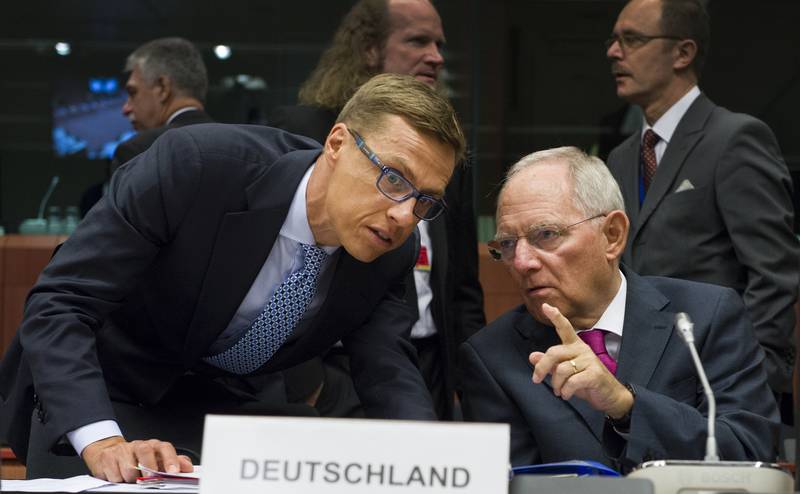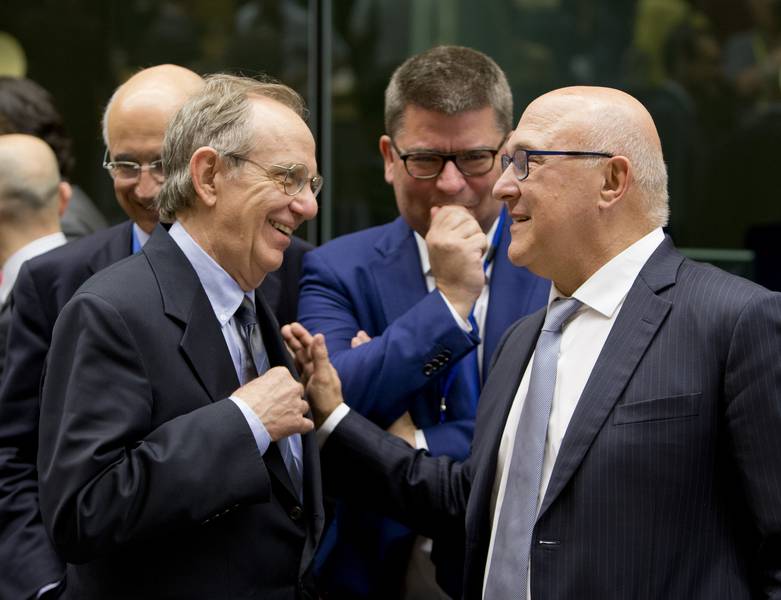Eurozone Goes into a “What To Do with Myself?” Mode
Adelina Marini, August 13, 2015
 While at a global level the giants USA and China have entered a new level of currency wars, the EU is looking at a second fall into self-reflection mode on what to do with itself in the setting of the second Greek crisis and the unsatisfactory outcome of the shared debt crisis in the common currency area. It is expected in September member states will begin heated debates on the future of the Eurozone, based on the report of the five presidents and the ideas that France and Germany pushed forward in early June. At that time, the Ministers of Economics of the two countries – Emmanuel Macron and Sigmar Gabriel – came forward with a shared article in the British centre-left newspaper The Guardian where they laid out their ideas on the future of the Eurozone. According to them, Greece and Great Britain are the big challenge to the European ideal, which is a result of the flaws of the European architecture, uncovered by the crisis of the last few years.
While at a global level the giants USA and China have entered a new level of currency wars, the EU is looking at a second fall into self-reflection mode on what to do with itself in the setting of the second Greek crisis and the unsatisfactory outcome of the shared debt crisis in the common currency area. It is expected in September member states will begin heated debates on the future of the Eurozone, based on the report of the five presidents and the ideas that France and Germany pushed forward in early June. At that time, the Ministers of Economics of the two countries – Emmanuel Macron and Sigmar Gabriel – came forward with a shared article in the British centre-left newspaper The Guardian where they laid out their ideas on the future of the Eurozone. According to them, Greece and Great Britain are the big challenge to the European ideal, which is a result of the flaws of the European architecture, uncovered by the crisis of the last few years.
According to them, economic convergence has failed and it is time for boosting economic unity by starting a new convergence process that includes not only structural reforms of labour markets and business environment, but institutional reforms at the European level, including social and tax convergence. For this to happen, a common budget, a minister of finance, and European Parliament representation of the Eurozone should be instituted. Some of Mr Macron and Mr Gabriel’s ideas are reflected in the five presidents’ report, first presented at the EU’s June summit. For a further, more serious deepening of integration within the Eurozone spoke also Italian Minister of Finance Pier Carlo Padoan this summer. He said recently in an interview for The Financial Times that going towards a political union is the way to go.
“The exit [from the Eurozone] and therefore the end of irreversibility [of the Euro] is now an option on the table. Let’s not fool ourselves,” he said, and also appealed for the establishment of a common Eurozone budget and the launch of a common unemployment insurance scheme.
What to do with Greece?
The large obstacle to the renewed integration efforts of the Eurozone that had faded with the first signs of exiting the crisis a year and a half ago turns out to be Greece. In the weeks before the publishing of the five presidents’ report expectations were that now is not the time for new ideas, especially ones asking for the re-opening of the treaties for changes exactly ten years after the project for an European Constitution failed at referendums in France and The Netherlands. An eventual opening of the founding treaties of the EU in a moment when Great Britain wants changes in its own interest and when there is no unanimity on how Greece is to be approached could throw the Union in a long-term chaos, which will only deepen the already too deep differences.
At the moment, the relations with Greece seem to be back to their normal flow, but under the surface you can feel a powerful death-current. Something deep has been broken between Athens and Brussels over the last few months and even the exit of the main irritant – Minister of Finance Yanis Varoufakis – does not manage to change attitudes. At the moment, negotiations on a third bailout programme worth 85 billion Euros are at their end, but Germany and Finland are sceptical and reserved. Berlin insists not to rush with a third bailout programme but rather negotiate a second bridge financing until the programme has been agreed on to the tiniest detail and the involvement of the International Monetary Fund is clarified. Without the Washington-based organisation Germany refuses to accept a third programme.
At first glance it looks like Berlin insists on stricter terms but actually the resistance in the German capital and in other sceptical countries is rather due to a lack of assurance that a third programme could solve Greece’s main issues, which are political. As if to feed those fears the leader of the left platform in ruling party SYRIZA and former Minister of Energy Panagiotis Lafazanis announced the establishment of an anti-bailout movement that will fight with all might against signing a third pack of loans to Greece. Heavy debates are going on at the moment in Greek parliament on what was negotiated in the last few weeks. According to leaked excerpts, the contents of the third programme are expected to be even more difficult to comply with than the guidelines, agreed on during the Eurozone summit in July. This makes completing it even more challenging than before.
The lack of unity in the views on Greece poses the question of how reasonable would it be to discuss the deepening of integration within the common currency zone while Greece is still a member of the currency club. The discussion was joined by the German council of economic advisers, financed by the government, with their latest report, which expresses resistance towards the creation of a European Ministry of Finance and the deepening of integration at large at this time. “Such overzealous steps toward integration would violate the founding principle to unite responsibility and control”, the economists wrote.  The opinion of the German government’s economic advisers is that such a step towards integration will create a transfer union where taxpayer funds are shifted from one country to another.
The opinion of the German government’s economic advisers is that such a step towards integration will create a transfer union where taxpayer funds are shifted from one country to another.
Instead of integration it is best the Eurozone concentrates on stricter fiscal rules to prevent countries from overspending. Economists also called for the creation of a bankruptcy mechanism for member countries that would allow for their exit without problems to the currency block. Somewhat surprisingly it was the European Commission that fell victim to the request for stricter fiscal rules as it was sharply criticised by German Finance Minister Wolfgang Schäuble this summer. He asked that the Commission be deprived of some key supervisory functions to prevent its politicisation. Turning the EC into a political body was expected to create trouble, but not so soon. The boss of the EC Jean-Claude Juncker announced back when he ran for the office last summer that he will work for a political Commission.
The new line is already felt in many of the actions of the body, dubbed “protector of the treaties”. The politicising was seen most clearly during this year’s European semester. The process hinted of itself also in the EC’s attitude towards the Cooperation and Verification Mechanism of Bulgaria and Romania. This process is a problem to the German finance minister who believes Eurozone budget rules must be automatic. When a state breaks the rules for public debt and budget deficit sanctions should be automatic. Germany was outraged that France got another deferment to fix its excessive budget deficit.
The Financial Times quotes EC spokesperson Mina Andreeva who claims the political style of Jean-Claude Juncker’s Commission is fully justified due to last year’s European parliament elections, when for the first time the leader of the EC was elected after a true campaign and after nominations from the European political parties. “It does not mean a political commission is more partisan,” she assured the British financial daily.
Whatever actions are taken for the future of the Eurozone one should not forget that a large portion of Greece’s (and not only their) problems are brought about by bad governance. At the Eurozone level one of the biggest flaws is that an almost total economic integration was allowed but fiscal policy and decision-making stayed fragmented and inconsistent. This is a result of the policy of compromise, or of the small step. In their article of June 3rd Sigmar Gabriel and Emmanuel Macron diagnose the problem accurately: “The current, rules-based fiscal framework – while flexible and important, to ensure fiscal discipline – doesn’t guarantee that the sum of national fiscal policies will lead to an adequate fiscal stance for the Eurozone as a whole, in either good or in bad times".
For the Eurozone not only to continue to exist, but to turn into a true economic and monetary union it needs to end the possibility that bad policies can infect the whole currency block with economic problems. It is also extremely important to avoid the possibility that the EU falls into introversion again as it did during the discussion on a European Constitution that ended with the signing of the Lisbon Treaty. This took almost ten years, but only a year after the Lisbon Treaty entered into force it became clear it no longer corresponded with global realities, let alone be able to solve newly arisen problems in the Eurozone. Just as important will be not to miss the opportunity, during the discussions of the Eurozone future, to talk about foreign policy which, as current currency wars are showing, will be accompanying any currency from now on.
discussions of the Eurozone future, to talk about foreign policy which, as current currency wars are showing, will be accompanying any currency from now on.
Gabriel and Macron see the Eurozone as the EU’s core, which poses again the question what is to be done with countries outside the Eurozone, especially the ones that committed in their treaties to join as soon as ready. As euinside already wrote, it is worth thinking about re-negotiation of Eurozone membership conditions, especially if within a new process of economic convergence is launched.
Translated by Stanimir Stoev
 Klaus Regling | © Council of the EU
Klaus Regling | © Council of the EU Mario Centeno | © Council of the EU
Mario Centeno | © Council of the EU Mario Centeno | © Council of the EU
Mario Centeno | © Council of the EU Angela Merkel, Emmanuel Macron | © Council of the EU
Angela Merkel, Emmanuel Macron | © Council of the EU Benoit Coeure | © Council of the EU
Benoit Coeure | © Council of the EU Pierre Moscovici | © Council of the EU
Pierre Moscovici | © Council of the EU